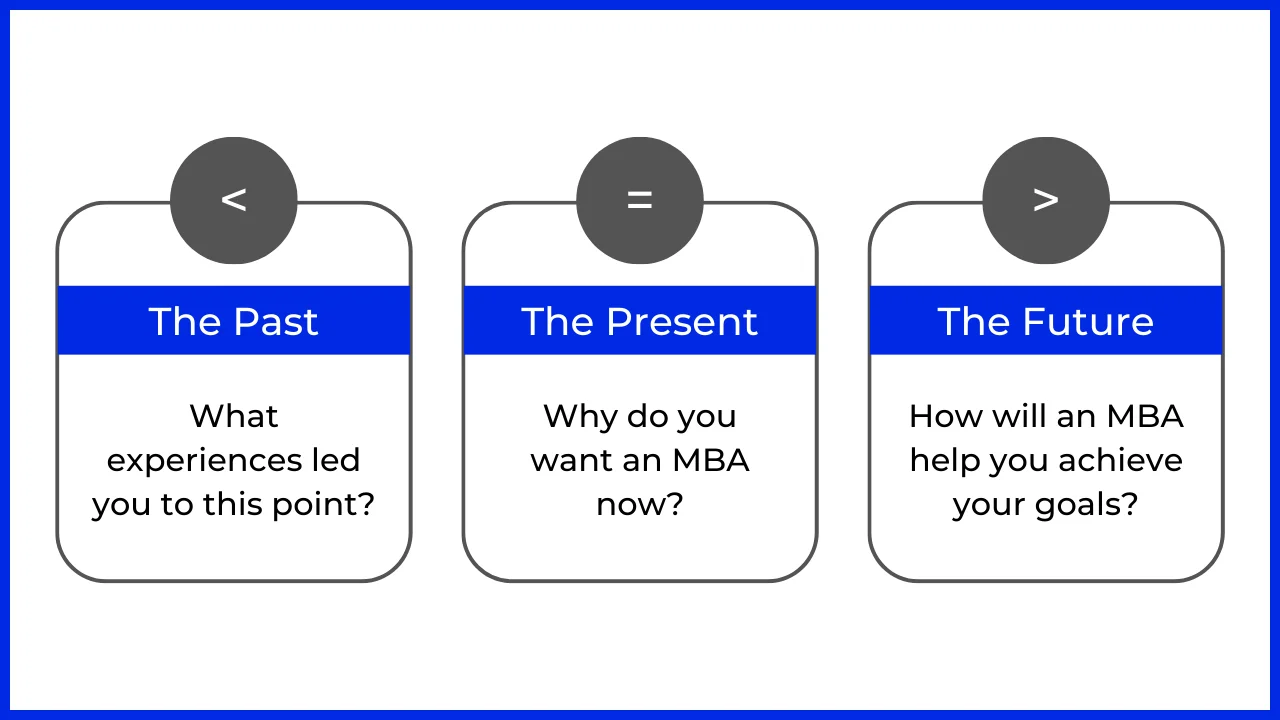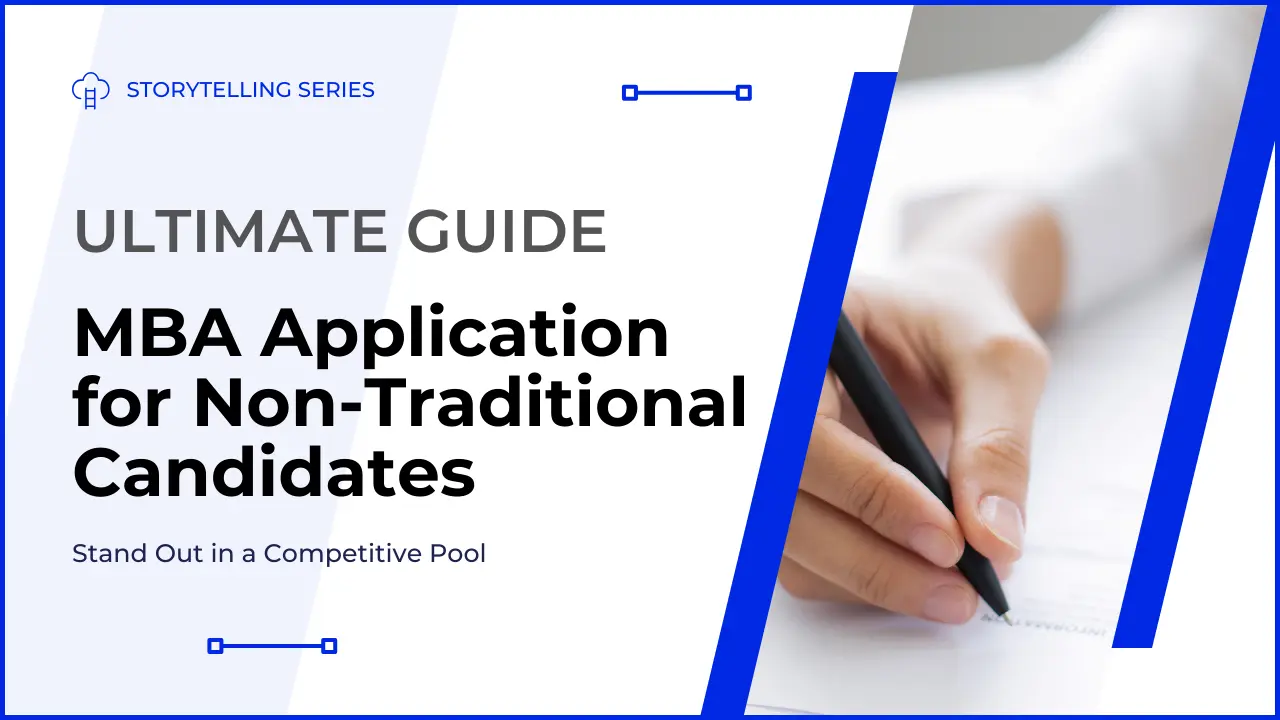Unconventional to UNIQUE
Here’s a shocking truth:
Some of the most successful MBA students don’t come from traditional business backgrounds.
That’s right. While you might think you’re at a disadvantage as a teacher, engineer, or artist applying to business school, you actually have a secret weapon:
Your unique perspective.
But here’s the catch:
You need to know how to leverage your non-traditional background in your MBA application.
And that’s exactly what I’m going to show you in this guide.
By the end of this post, you’ll know:
- Why business schools are actively seeking non-traditional candidates
- How to turn your unconventional background into your biggest strength
- Specific strategies for crafting a standout application
- How to address common concerns about your non-business background
Plus, I’ll share insider tips I’ve gathered from admissions officers at top business schools.
Ready to transform your non-traditional background into your ticket to a top MBA program?
Let’s dive in.
We’ll look at…
- Why Business Schools Want Non-Traditional Candidates
- Identifying Your Unique Value Proposition
- Crafting Your Non-Traditional Candidate Story
- Addressing Potential Concerns in Your Application
- MBA Applications for Non-Traditional Candidates: Showcasing Transferable Skills
- Leveraging Your Background in Essays
- Acing the Interview as a Non-Traditional Candidate
- Building a Network in the Business World
- Financing Your MBA as a Career Switcher
- Success Stories: Non-Traditional Candidates Who Made It
- FAQs: MBA Applications for Non-Traditional Candidates
1. Why Business Schools Want Non-Traditional Candidates
Let’s start with some good news:
Business schools are actively seeking candidates like you.
But why?
Here are 5 reasons schools want non-traditional applicants:
- Diverse perspectives: Your unique background brings fresh insights to class discussions.
- Innovation potential: Non-traditional thinkers often drive business innovation.
- Interesting class makeup: A diverse student body makes for a more engaging learning environment.
- Future industry bridges: Your expertise can bridge MBA learnings with non-traditional industries.
- Unique leadership styles: Different backgrounds foster diverse approaches to leadership.
Don’t believe me? Here’s what Kirsten Moss, Assistant Dean of MBA Admissions at Stanford GSB, says:
“We are looking for diversity of experience and perspective in our student body. Non-traditional applicants often bring unique insights that enrich the learning experience for everyone.”
The takeaway? Your non-traditional background isn’t just acceptable—it’s desirable.
2. Identifying Your Unique Value Proposition
Now that you know schools want you, it’s time to identify what makes you unique.
Your Unique Value Proposition (UVP) is the special blend of experiences, skills, and perspectives you’ll bring to an MBA program.
Here’s how to uncover yours:
- List your non-business experiences: Include jobs, volunteer work, hobbies, and personal projects.
- Identify transferable skills: Look for skills like leadership, problem-solving, or creativity that apply to business.
- Note unique perspectives: How does your background give you a different view on business issues?
- Consider your network: Do you have connections in industries or fields unusual for MBA candidates?
- Reflect on your motivations: Why do you want an MBA? How does it fit into your unique career path?
Let’s take an example and break down the UVP. Let’s say you’re a high school teacher applying for an MBA:
- Experience: 5 years teaching, curriculum development, parent-teacher association leader
- Transferable skills: Leadership, communication, project management, conflict resolution
- Unique perspective: Understanding of education industry, insight into Gen Z as future consumers
- Network: Connections in education sector, potential for edtech innovations
- Motivation: Want to transition into education policy or edtech leadership
See how a teaching background translates into valuable business skills and insights?
Action step: Spend 30 minutes brainstorming your UVP using the categories above. This will be the foundation of your application strategy.
Start Your MBA Journey with a Free Profile Evaluation Today
Start Your MBA Journey with a Free Profile Evaluation Today
3. Crafting Your Non-Traditional Candidate Story
Now that you’ve identified your UVP, it’s time to weave it into a compelling narrative.
Your goal? To tell a story that connects your past experiences, your desire for an MBA, and your future goals.
Here’s a simple 3-step framework for crafting your story:
- The Past: What experiences led you to this point?
- The Present: Why do you want an MBA now?
- The Future: How will an MBA help you achieve your goals?
Let’s break each of these down:

The Past
- Highlight key experiences that developed your leadership, analytical, or entrepreneurial skills.
- Show how your non-traditional background gave you unique insights.
- Discuss any moments that sparked your interest in business.
The Present
- Explain why you’re transitioning to business now.
- Discuss any steps you’ve already taken towards this transition (e.g., business courses, entrepreneurial ventures).
- Connect your current skills to the MBA curriculum.
The Future
- Outline your short-term and long-term career goals.
- Explain how an MBA is essential for achieving these goals.
- Show how your unique background + MBA will make you a standout leader in your chosen field.
Here’s an example for our teacher turned MBA applicant:
“In my five years as a teacher, I’ve led curriculum overhauls, managed diverse teams of educators, and solved complex logistical challenges—all on a shoestring budget. These experiences honed my leadership and innovation skills and also exposed me to the pressing need for better management in education. I’m pursuing an MBA now to combine my education insights with business acumen. Post-MBA, I aim to join an edtech startup, leveraging my unique blend of classroom experience and management skills to create solutions that truly serve teachers and students. Ultimately, I envision founding my own company that bridges the gap between educators and education policy makers.”
Remember: Your story should not apologize for your non-traditional background. Instead, it should celebrate how your unique experiences have prepared you for business school and beyond.
Want to do a deep dive into how storytelling can help set your application apart? Read our complete guide here: MBA Essay Writing: A Complete Guide to Storytelling Techniques
4. Addressing Potential Concerns in Your Application
Let’s face it: As a non-traditional applicant, there might be some questions about your candidacy.
But here’s the good news:
You can address these head-on in your application.
Here are common concerns and how to tackle them:
Concern 1: Lack of Quantitative Skills
If you’re coming from a non-quantitative background, schools might wonder about your ability to handle MBA-level math.
How to address it:
- Take quantitative courses (e.g., statistics, financial accounting) and earn good grades
- Highlight any data analysis or budgeting responsibilities in your current role
- Crush the quantitative section of the GMAT or GRE
Concern 2: No Business Experience
Schools might question your understanding of business concepts and environments.
How to address it:
- Discuss any entrepreneurial ventures or business-related projects you’ve undertaken
- Highlight transferable skills from your current field that apply to business
- Show your commitment to learning business basics (e.g., through online courses and informational interviews with business leaders)
Concern 3: Unclear Career Goals
As a career switcher, your post-MBA goals might seem less defined.
How to address it:
- Clearly articulate your short-term and long-term goals
- Show how your past experiences + MBA education align with these goals
- Demonstrate research into your target industry/role (e.g., mention specific companies, roles, or industry trends)
Concern 4: Lack of Leadership Experience
Business schools want to develop future leaders.
How to address it:
- Highlight leadership experiences from your current field, even if they’re not traditional business leadership roles
- Discuss times you’ve influenced others or driven change without formal authority
- Show how you’ve sought out and taken on additional responsibilities
Concern 5: Ability to Contribute to Class Discussions
Schools might wonder how you’ll contribute to case discussions without a business background.
How to address it:
- Highlight how your unique perspective can offer fresh insights on business problems
- Discuss experiences where you’ve had to quickly learn and apply new concepts
- Show your interpersonal skills and ability to work in diverse teams
Remember: The key is to address these concerns proactively. Don’t wait for schools to ask—anticipate their questions and answer them in your application.
Start Your MBA Journey with a Free Profile Evaluation Today
Start Your MBA Journey with a Free Profile Evaluation Today
5. MBA Applications for Non-Traditional Candidates: Showcasing Transferable Skills
Here’s a secret that will make you feel a lot better about your non-traditional background:
Many of the skills you’ve developed in your current field are exactly what business schools are looking for.
These are called transferable skills.
Let’s break down some key transferable skills and how to showcase them:
A. Leadership
- What it means in business: Guiding teams, making decisions, and setting vision
- How you might have it: Leading projects, mentoring junior colleagues, or captaining a sports team
- How to showcase it: Quantify your impact (e.g., “Led a team of 5 to increase department efficiency by 20%”)
B. Communication
- What it means in business: Clear writing, persuasive speaking, and effective presentations
- How you might have it: Writing reports, giving lectures, or presenting to clients
- How to showcase it: Highlight instances where your communication led to positive outcomes
C. Problem-solving
- What it means in business: Analyzing issues, developing solutions, and implementing changes
- How you might have it: Troubleshooting technical issues, resolving conflicts, or optimizing processes
- How to showcase it: Use the STAR method (Situation, Task, Action, Result) to describe a significant problem you solved
D. Adaptability
- What it means in business: Thriving in changing environments and learning quickly
- How you might have it: Changing roles within your organization, working in diverse teams, or living abroad
- How to showcase it: Describe how you’ve successfully navigated change or learned new skills rapidly
E. Innovation
- What it means in business: Developing new ideas and improving processes
- How you might have it: Creating new programs, finding creative solutions to problems, or starting a side project
- How to showcase it: Highlight any initiatives you’ve started or improvements you’ve implemented
F. Analytical Thinking
- What it means in business: Interpreting data, drawing insights, and making data-driven decisions
- How you might have it: Analyzing trends in your field, using data to inform decisions, or conducting research
- How to showcase it: Describe how you’ve used data or analysis to drive decision-making
G. Teamwork
- What it means in business: Collaborating effectively and managing diverse personalities
- How you might have it: Working on cross-functional projects or participating in team sports, volunteering
- How to showcase it: Highlight roles where you’ve had to collaborate with diverse groups to achieve a common goal
Pro tip: Create a “skills inventory” by listing these transferable skills and noting specific examples of how you’ve demonstrated each in your current field. Use these examples throughout your application.
Remember: It’s not just about listing these skills. You need to show how you’ve applied them to achieve results. Use specific examples and quantify your impact whenever possible.
6. Leveraging Your Background in Essays

Your essays are your chance to bring your non-traditional background to life.
Here’s how to make your essays stand out:
A. Tell Stories That Highlight Your Unique Perspective
Use the “Share an experience” essays to showcase how your background gives you a different view on business issues.
Example: “As a social worker, I once had to implement a new case management system with a limited budget and resistant staff. This experience taught me valuable lessons about change management and resource allocation that I’ll bring to business school discussions.”
B. Connect Your Past to Your Future
Show how your non-traditional background has led you to your current MBA goals.
Example: “My experience as an architect has shown me the transformative power of thoughtful design. An MBA will allow me to apply these design thinking principles to business problems, ultimately leading to my goal of launching a consultancy that helps companies create more human-centered products and services.”
C. Demonstrate Your Research
Show that you’ve done your homework about the business world and the specific MBA program.
Example: “While my background is in biology, I’ve been fascinated by the intersection of science and business. I’m particularly excited about [School’s] Healthcare Management program, which will allow me to combine my scientific knowledge with business acumen to drive innovations in biotech.”
D. Address Potential Concerns Head-On
Use the optional essay (if available) to address any concerns about your background.
Example: “While my role as a teacher might not seem directly related to business, it has honed my leadership, communication, and problem-solving skills. To prepare for the quantitative rigors of an MBA, I’ve also completed courses in statistics and financial accounting, earning A’s in both.”
E. Show, Don’t Tell
Instead of just stating your skills, show them through specific examples.
Instead of: “I have strong leadership skills.”
Try: “When budget cuts threatened to shut down our youth program, I rallied a team of 10 volunteers, launched a crowdfunding campaign that raised $50,000, and ultimately expanded our services to reach 50% more at-risk youth.”
F. Highlight Your Potential Contributions
Discuss how your unique background will add value to the MBA cohort.
Example: “As one of the few applicants with a background in environmental science, I look forward to bringing insights about sustainability and green technology to class discussions, particularly in courses on operations management and corporate social responsibility.”
G. Be Authentic
Don’t try to sound like a “traditional” business school applicant. Your unique voice and experiences are your strength.
Remember: Your goal is not just to explain why you want an MBA, but to show how your non-traditional background makes you a valuable addition to the MBA program.
Start Your MBA Journey with a Free Profile Evaluation Today
Start Your MBA Journey with a Free Profile Evaluation Today
7. Acing the Interview as a Non-Traditional Candidate
Congratulations! If you’ve been invited to interview, the school is already interested in your unique profile. Now it’s time to bring your application to life.
Here’s how to ace your interview as a non-traditional candidate:
A. Bridge Your Background to Business
Be prepared to clearly articulate how your non-traditional experience relates to business and your future goals.
Example answer: “As a teacher, I’ve honed skills in leadership, communication, and problem-solving that are directly applicable to business. For instance, launching a new STEM program at my school required me to secure funding, manage a budget, lead a team, and ‘market’ the program to students and parents – all skills crucial in the business world.”
B. Show You’ve Done Your Homework
Demonstrate that you understand the business world and MBA program, despite your non-traditional background.
Example question: “What recent business news has interested you?”
Example answer: “I’ve been following the recent developments in AI and their potential impact on various industries. As someone coming from a background in psychology, I’m particularly interested in how AI might change human-computer interaction and what this means for businesses trying to enhance customer experiences.”
C. Address the “Why MBA” Question Convincingly
Be clear about why you need an MBA to achieve your goals.
Example answer: “While my background in environmental science has given me a deep understanding of sustainability issues, an MBA will provide me with the business acumen to translate that knowledge into actionable corporate strategies. I’m particularly excited about [School’s] focus on sustainable business practices, which aligns perfectly with my goal of helping companies implement environmentally responsible policies without sacrificing profitability.”
D. Highlight Your Unique Contributions
Emphasize how your non-traditional background will add value to the MBA cohort.
Example question: “How will you contribute to our MBA community?”
Example answer: “As a former journalist, I bring a unique perspective on communication and media to the MBA program. I can contribute to class discussions with insights on how businesses can effectively navigate today’s complex media landscape. Additionally, my investigative skills will be valuable in case studies, allowing me to uncover and analyze key information quickly.”
E. Demonstrate Adaptability
Show that you can thrive in new environments – a crucial skill for career switchers.
Example question: “How do you handle new and challenging situations?”
Example answer: “In my role as a professional athlete, I frequently had to adapt to new teams, coaches, and strategies. For instance, when I transferred to a team in a different country, I had to quickly learn a new language, understand different cultural norms, and adapt my playing style. This experience has honed my ability to learn quickly and thrive in diverse, challenging environments – skills I’ll bring to the MBA classroom and my post-MBA career.”
F. Be Ready for “Why Should We Choose You Over a Traditional Candidate?”
This is your chance to really sell your unique value proposition.
Example answer: “While traditional candidates bring valuable business experience, my background as a bioengineer brings a fresh perspective to business problems. I can approach issues with a scientific mindset, bringing data-driven decision-making and innovative problem-solving techniques to the table. Moreover, my experience in the healthcare sector gives me unique insights into one of the largest and fastest-growing industries in the world. This combination of scientific thinking and industry knowledge will allow me to contribute unique viewpoints to class discussions and team projects.”
G. Prepare for Technical Questions
Be ready to demonstrate your business knowledge, especially if you’re from a non-quantitative background.
Example question: “How would you value a company?”
Example answer: “While my background is in education, I’ve been proactively preparing for the quantitative aspects of an MBA. There are several methods to value a company, including Discounted Cash Flow analysis, comparable company analysis, and precedent transactions. For instance, in DCF, you’d project the company’s future cash flows and discount them back to present value. I’ve been studying these concepts through online courses and would be excited to delve deeper into them during the MBA program.”
Remember: The key to a successful interview is preparation. Practice your answers, but make sure they sound natural, not rehearsed. And always tie your responses back to why you’re a great fit for their MBA program.
8. Building a Network in the Business World
As a non-traditional candidate, networking is crucial. It helps you understand the business world better and can even strengthen your application.
Here’s how to build your business network:
A. Leverage LinkedIn
- Optimize your profile to highlight transferable skills
- Connect with alumni from your target MBA programs
- Join groups related to your target industries
Pro tip: When connecting with someone new, always send a personalized message explaining why you want to connect.
B. Attend MBA Fairs and Information Sessions
- Prepare questions that showcase your research and enthusiasm
- Follow up with admissions officers or alumni you meet
Example follow-up message: “Dear [Name], Thank you for taking the time to speak with me at the MBA fair yesterday. Our discussion about [School’s] entrepreneurship program was incredibly insightful. Your point about how my background in product design could be valuable in the program’s startup incubator really resonated with me. I’d love to learn more about…”
C. Conduct Informational Interviews
- Reach out to professionals in your target post-MBA industry
- Prepare thoughtful questions about their career path and industry trends
Example outreach message: “Dear [Name], I hope this message finds you well. I’m currently a software engineer considering an MBA to transition into product management. Given your successful career in this field, I would be grateful for the opportunity to speak with you for 15-20 minutes about your experiences and any advice you might have for someone looking to make a similar transition. Thank you for your time and consideration.”
D. Join Professional Associations
- Look for associations in your target industry
- Attend events and volunteer for committees
E. Take Business-related Courses
- Enroll in online courses or local classes in business basics
- Use these courses to build relationships with instructors and classmates
F. Volunteer for Business-oriented Projects
- Offer your professional skills to local nonprofits or startups
- This can provide business experience and expand your network
G. Start a Side Project
- Launch a small business or freelance in your area of expertise
- This shows initiative and provides real-world business experience
Remember: Networking isn’t just about what others can do for you. Always think about how you can add value to others’ networks too.
Start Your MBA Journey with a Free Profile Evaluation Today
Start Your MBA Journey with a Free Profile Evaluation Today
9. Financing Your MBA as a Career Switcher

Financing an MBA can be challenging, especially if you’re leaving an established career.
Here’s how to approach it:
A. Understand the Full Cost
- Calculate tuition, living expenses, and opportunity cost of lost income
- Factor in potential post-MBA salary increases
B. Explore School-Specific Scholarships
- Many schools have scholarships for career switchers or non-traditional applicants. For example, Harvard Business School’s Forward Fellowship for students from lower-income backgrounds
C. Look for External Scholarships
- Research scholarships for your specific background or target industry. For example, The Forté Foundation offers scholarships for women pursuing MBAs
D. Consider Loan Options
- Federal loans (for U.S. students)
- Private loans
- International student loans
Pro tip: Some companies offer better rates for career switchers with strong academic profiles.
E. Investigate Employer Sponsorship
- Even if your current employer doesn’t typically sponsor MBAs, make a case for how it could benefit them
F. Explore Part-Time or Executive MBA Programs
- These allow you to keep working while studying
- Some employers may be more willing to provide financial support for these programs
G. Look into Loan Forgiveness Programs
- Some organizations offer loan forgiveness for MBAs who work in certain industries post-graduation. For example, The Wharton Social Impact Initiative offers loan forgiveness for graduates working in social impact roles
H. Consider MBA Internship Earnings
- Summer internships can provide significant income to offset costs
- Some schools offer internship opportunities during the academic year as well
Remember: An MBA is a significant investment. Make sure you have a clear understanding of the ROI for your specific situation.
10. Success Stories: Non-Traditional Candidates Who Made It
Nothing inspires quite like success stories.
Here are a few examples of non-traditional candidates who got into top MBA programs:
1. The Virtual Reality Magician
Sagar Kaushik, an accomplished Director of Photography got Cambridge Judge Business School.
Key strategies:
Leveraged Industry Experience: Sagar emphasized his unique background as a filmmaker and cinematographer, highlighting how his visual storytelling skills and industry experience would bring a fresh perspective to the MBA cohort.
Demonstrated Adaptability and Strategic Thinking: He showcased his ability to adapt to industry changes during the pandemic by working on diverse projects and exploring the business side of storytelling, demonstrating strategic thinking and resilience.
Established Personal Connection in Interviews: Sagar prepared thoroughly for his interview by researching his interviewer and finding common ground, such as the concept of ‘nudging’ and the implications of AI in media, making his interview engaging and successful.
Post-MBA: Sagar will start his MBA studies in August 2024
2. The Sports Enthusiast
Divyaditya Singh, a major player in the online sports media industry, got into the Indian Business School (ISB).
Key strategies:
Showcased Leadership and Resilience: Divyaditya emphasized overcoming setbacks and leading cross-functional teams to show significant revenue growth, demonstrating his leadership and problem-solving skills.
Emphasized Networking and Collaboration: He highlighted his successful partnerships and networking efforts, such as onboarding ICAI zones and collaborating with industry leaders, to illustrate his ability to foster professional relationships.
Combined Personal and Professional Development: Divyaditya integrated his diverse extracurricular involvement with professional achievements to showcase a well-rounded personality and leadership potential.
Post-MBA: Joined a leading technology company in a senior operations role
3. The Navy Vetera
Tapaswi Shetty, a former Lieutenant Commander in the Indian Navy, got into UBC Sauder.
Key strategies:
Leveraged Military Leadership and Discipline: Tapaswi highlighted his extensive military background to demonstrate strong leadership, discipline, and problem-solving skills that align with the values of UBC Sauder.
Focused on Personal and Family Goals: He aligned his MBA aspirations with personal goals, emphasizing how the program’s structure and location would support his family’s needs and his transition to a civilian career.
Highlighted Commitment to EDI: Tapaswi showcased his commitment to equity, diversity, and inclusion through examples of promoting a respectful and supportive environment in his military career, which resonates with the school’s values.
Post-MBA: Joined as Project Manager of a key unit of the Indian Navy
4. The Political Guru
Kartik Bhatia, who was a Campaign Manager for a major political party in India, got into IIM-A.
Key strategies:
Highlighted Diverse Professional Background: Kartik showcased his experience in technology consulting, policy-making, and political consulting, demonstrating a unique blend of skills and perspectives.
Focused on Clear Career Goals: He articulated his long-term ambition in political consulting and short-term goals in strategy consulting, aligning them with the MBA program’s offerings.
Demonstrated Adaptability and Commitment: Kartik emphasized his ability to adapt and excel in various roles, along with his disciplined approach to GMAT preparation and application process, supported by Crackverbal’s structured guidance.
Post-MBA: Joined as Program Manager in a leading IT Consulting Firm
5. The Military Expert
Prashant Bhaisora, a Military veteran passionate about formulating strategic vision and business processes, got into University of Warwick.
Key strategies:
Leveraged Military Experience: Prashant highlighted his extensive 20-year military career to demonstrate leadership, discipline, and unique experiences that set him apart from other applicants.
Strong Academic and Professional Profile: He emphasized a strong academic background along with relevant professional experiences, ensuring his application reflected a blend of academic rigor and practical knowledge.
Clear Career Goals and Personal Statement: Prashant crafted a compelling personal statement that clearly outlined his career goals and motivations for pursuing an MBA, showcasing his commitment and strategic vision for his future (YouTube).
Post-MBA: Currently a full-time MBA candidate
Watch Prashant’s success story here:
Conclusion: Your Non-Traditional Background is Your Strength
If you’ve made it this far, congratulations! You now have a comprehensive playbook for crafting a stellar MBA application as a non-traditional candidate.
Remember the key points:
- Your unique background is an asset, not a liability.
- Focus on transferable skills and how they apply to business.
- Craft a compelling narrative that connects your past, present, and future.
- Address potential concerns proactively.
- Show how you’ll contribute to the diversity of the MBA class.
- Do your research and articulate clear, achievable post-MBA goals.
Most importantly, be authentic. Your genuine passion and unique perspective are what will make you stand out in the application process.
Now, it’s time to take action. Start by identifying your unique value proposition, then work through each section of this guide to craft your application strategy.
Remember, every successful MBA student was once an applicant, wondering if they had what it takes. With the right approach, you can join their ranks.
Good luck with your MBA journey!





0 Comments